In 2015 Military Intelligence (further reference as „MI“) fulfilled tasks of intelligence securing of the Slovak Republic (further reference as „SR“) defence in scope of powers of the Ministry of Defence of Slovak Republic (further reference as „MO SR“) in extent established by the Act No. 198/1994 on Military Intelligence as amended.
Intelligence activities of MI in 2015 were in compliance with specified priorities1) focused on gathering and collection of the information for early identification and evaluation of security threats indicators against interests of the SR and its allies.
Security environment of SR was in 2015 in terms of MI competence negatively affected mainly by security threats which sources were identified on the territory of the SR, European Union regions, West Balkan, Commonwealth of Independent States, Ukraine, Middle East and Near East and North Africa. Specific attention in relation to the presented regions was paid towards continuous evaluation of security situation development in crisis and conflict areas of the mentioned the regions.
In terms of MI competence capabilities of the own armed forces (including the military-industrial complex issue), combat potential of armed forces of foreign authorities2), negative impacts of propaganda on strategic level3), foreign military intelligence services activities, issue of terrorism, radicalism and extremism, migration processes issue, cyber attacks, criminal activities of individuals or organized groups related to the Defence area, efforts to acquire classified information by unauthorized persons, weapon systems, arms and military technology dissemination (including destruction weapons) in the evaluated period were monitored and evaluated.
The number of members and employees of MI reached 72, 46 ℅ from planned number of staff what represents increase by 5℅ in comparison with 2014 (31st December2015).
Within MI there were active 77℅ of professional soldiers and 23℅ of civilians employed within public interests, from this 78℅ are represent men and 22℅ women.
Average age o of MI staff is 44 years, 46℅ is represented by those under 40. University degree (including bachelor´s degree) hold 73℅.
Structure of MI personnel according to basic demographic attributes:
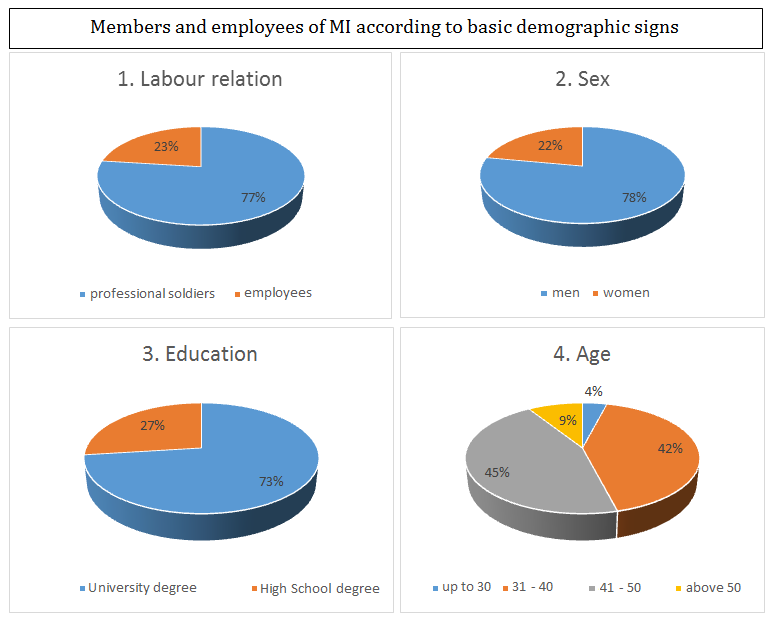
By the chapter administrator of the MO SR were itemized binding budget indexes for 2015 in the area of incomes in the amount of 31.100,00 EUR and in the field of expenses in the amount of 37.974.741, 00 EUR.
According to the economic budget classification the binding budget coefficient of expenses allocated to MI was itemized to the date 31th December 2015 as follows:
According to functional classification the MI expense budget was itemized in the subsection of functional classification 02.1.0.2 Military Intelligence.
In terms of program structure of budget expenses of budget section of MO SR, the budget resources of MI in 2015 were allocated as follows:
| Obligatory Budget Coefficient of MI Admission for Budget Year 2015 | Allocated Budget | Actual Utilization of the Budget on the Date 31.12.2015 | Budget Admission |
| INCOME BUDGET | 31 100,00 | 53 472,90 | 171,94 % |
| EXPENSE BUDGET | 37 974 741,00 | 37 974 652,64 | 100,00 % |
| from that: program 096 – Defence | 33 544 270,00 | 33 544 229,00 | 100,00 % |
| from that: program 095 – Defence Development | 4 430 471,00 | 4 430 423,64 | 100,00 % |
In the year 2015 MI had processed and provided 315 intelligence products to authorized and contractual subjects. From this number 188 intelligence information, 20 comprehensive intelligence information and 107 exchange intelligence information were released to partner intelligence services.
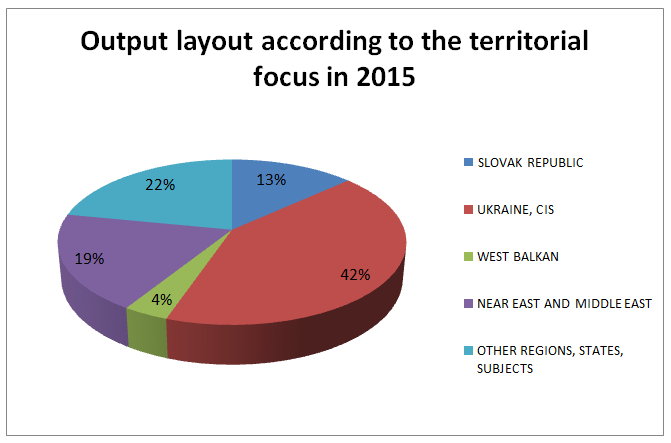
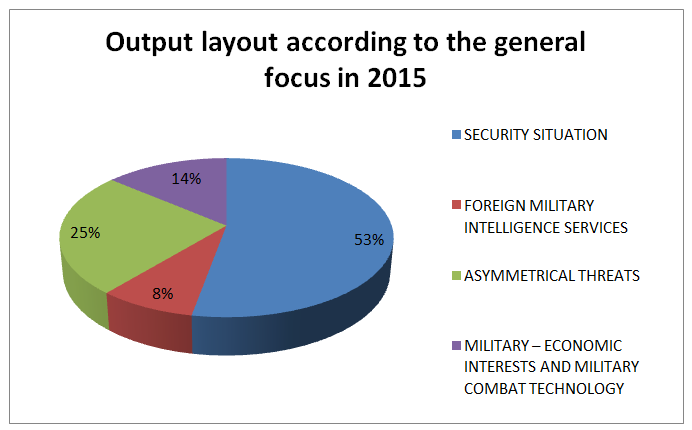
In the evaluated period significant attention was paid to capability development, which forms a part of program fulfilment „The Aims of Forces 2013“(following international commitments of SR – the membership of SR in NATO). It relates to the development of advanced technical and technological capabilities in the field of OSINT (open source intelligence) and SIGINT (signal intelligence). In the field of OSINT it regards mainly hardware and software tools and analytic tools for processing and assorting information in the social networks environment. In the field of IMINT it relates to the alliance program of united intelligence (JISR) – system of ground observation (AGS). The core in this area was set by training and preparation of the personnel for evaluating image data. In the field of SIGINT the modernization of organisational branch of the battalion ISTAR had begun4). Its organisational branches are consecutively being equipped by technical tools of intelligence and reconnaissance within the alliance program JISR.
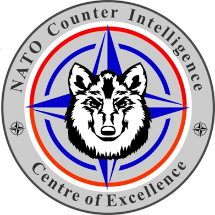 In 2015 the MI had actively joint the common Slovak – Polish project – The Centre of Excellence of NATO for the Field of the Counterintelligence capability further reference as „NATO CI CoE“5) with seat in Polish Krakow. SR and the Republic of Poland are the founding members of NATO CI CoE. The approach of Slovak representatives during founding NATO CI CoE was awarded from the part of cofounding (sponsoring) countries of the Centre as from the NATO institutions. The MO SR besides assignment of experienced members of Slovak Armed Forces for the needs of NATO CI CoE provides an access to the Center for Training Lešť for training and practical exercises under the command of the Center.
In 2015 the MI had actively joint the common Slovak – Polish project – The Centre of Excellence of NATO for the Field of the Counterintelligence capability further reference as „NATO CI CoE“5) with seat in Polish Krakow. SR and the Republic of Poland are the founding members of NATO CI CoE. The approach of Slovak representatives during founding NATO CI CoE was awarded from the part of cofounding (sponsoring) countries of the Centre as from the NATO institutions. The MO SR besides assignment of experienced members of Slovak Armed Forces for the needs of NATO CI CoE provides an access to the Center for Training Lešť for training and practical exercises under the command of the Center.
In the field of cyber threats in accordance with the Conception of Cyber Security and by the government approved Operational Plan of Realization of the Conception of Cyber Security 2015 -20206) measures has been taken mainly in the field of adjusting organisational structures within the MO SR organizational structures. Task accomplishment in the area of cyber threats is in terms of stated documents primarily within the competence of the National Security Office (further reference as „NBÚ“) of SR. In the evaluated period the MI had provided NBÚ SR complete assistance.
In February 2015 was established the Council for securing cyber environment (further reference as the „Council“) by the Minister of Defence of the SR regulation. The Council is an advisory authority of the Minister of Defence of the SR in the field of cyber security, which considers the state of cyber security and suggests potential measures in order to enhance security and resistibility of the cyber space. The chairman of the Council is the MI Director.
In the frame of the Operational plan, the Committee of the Security Council (further reference as „BR“) of SR on cyber security has been established, the member of which is the MI Deputy Director. The Committee represents a permanent operational authority of the BR in the SR in the field of the preparation and coordination of measures focused on the maintenance of the SR cyber security environment. The MO SR via the MI participated on preparation of the memorandum of understanding between NATO and SR in the field of cyber security. In accordance with the memorandum MO SR had established joint contact point for cyber incidents solution. Related to this contact point the new organisational and communication structure within MO SR and Armed Forces of Slovak Republic (further reference as „OS SR“) had been established.
As from 1st January until 31th December 2015 the MI submitted overall 60 requests for the use of information – technical means (further reference as „ITM“). 53 were approved by the legal judges.
In 7 cases the legal judge issued a denial stance regarding the request for ITM utilization.
From the overall number of 53 issued written approvals of the legal judge for ITM utilization by MI was the purpose approved by law and the aim was reached in 53 cases.
Information gained by ITM within MI were used in 5 cases as an evidence in criminal procedure.
MI used ITM in 2015 in accordance with the provision of law regarding protection from wiretapping and the Act on MI, whilst the utilization of ITM was realised in all cases in accordance with the provision of the law § 4 on wiretapping protection on the basis of the aforementioned written approval of the legal judge. In no case it had come to the illegal utilization of ITM.
Evaluation of the security situation in crisis and conflict areas had been focused mainly on the situation development in Ukraine, Syria and in the regions of OS SR deployment abroad. Those are areas and regions that in relation to the security of SR could be defined as sources of identified threats of asymmetric nature7). In the field of intelligence protection of the OS SR deployed abroad the activity of the MI was focused mainly on operations of international crisis management of NATO – RESOLTE SUPPORT in Afghanistan, European Union – EUFOR ALTHEA in Bosnia and Herzegovina and OSN – UNFICYP on Cyprus.
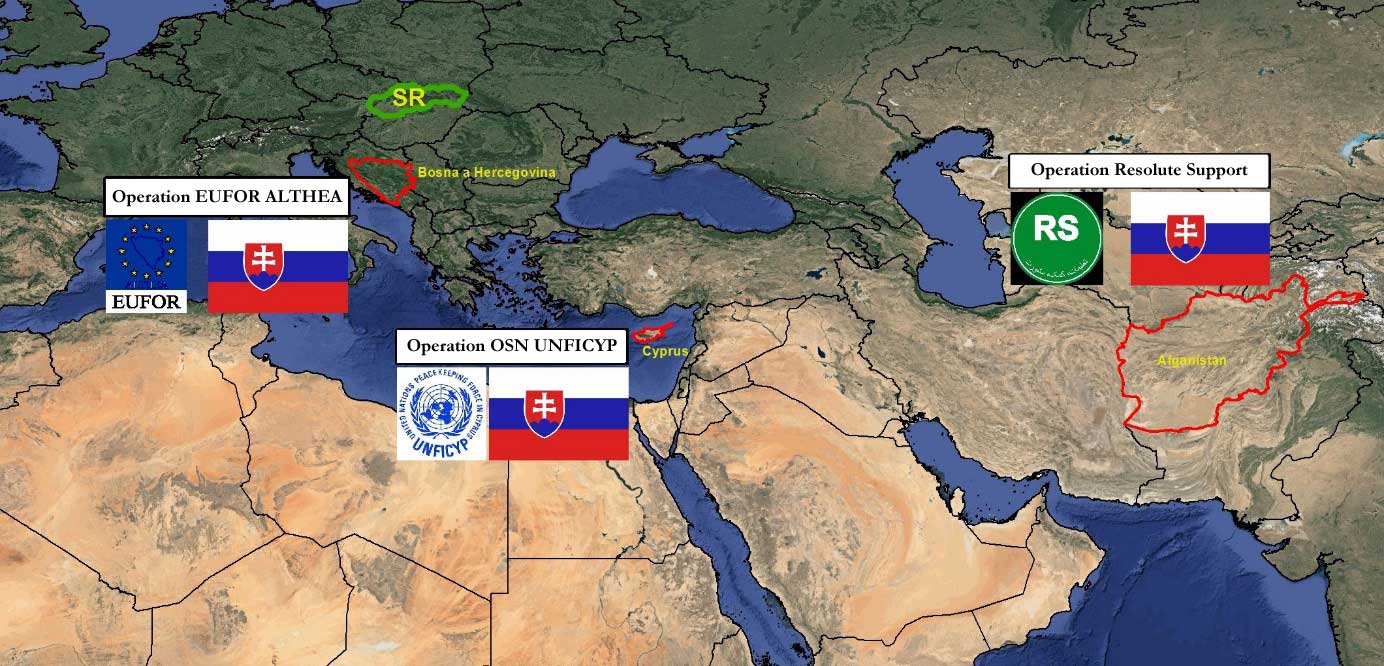
Negative development of security situation in Ukraine and Syria still represents a serious security threat. This trend will remain in a short term horizon unchanged. The development in these areas had been monitored and evaluated also in relation to the migration issue (mainly in relation to the issues of internally relocated people in Ukraine, migration route change due to closing borders of particular Schengen member states and transnational criminal activities). The main effort was dedicated to permanent (24/7) monitoring of the security situation development on Slovak – Ukraine border. For the task accomplishment was available personnel and technical capacities (HUMINT and SIGINT capabilities)and assistance was provided both at the operational and information level to the Police Forces of SR and Ministry of Finance of the SR.
Capabilities of Slovak Armed Forces and the combat potential of foreign armed forces belong to the key factors that influence the defence potential of the state. In the evaluated period MI gathered intelligence and provided information to the authorized subjects on current situation in the above mentioned regions. It was evaluated that prospective deepening of unbalance between dynamics of security environment development of SR and achieving capabilities of OS SR could have negative impact on securing defence potential as well as on accomplishment of international commitments of SR. Functioning of OS SR within security system of SR is dependent not only from set-up legislative frame8), level of development and achievement of its adequate capabilities9), but also from available source framework. Besides mentioned facts, was in relation to the OS SR capabilities, strong focus had been laid on continuous evaluation of negative propaganda impact on strategic level and on foreign military intelligence services activities concerning protected interests of SR. The level of activities of identified people involved in both of the above mentioned fields has reached raising trend. In this connection there exists an assumption that the level of negative impacts of these threats and intensity of activities of the identified people involved could get in medium-term horizon rise. Moreover, their spectrum will probably get broadened.
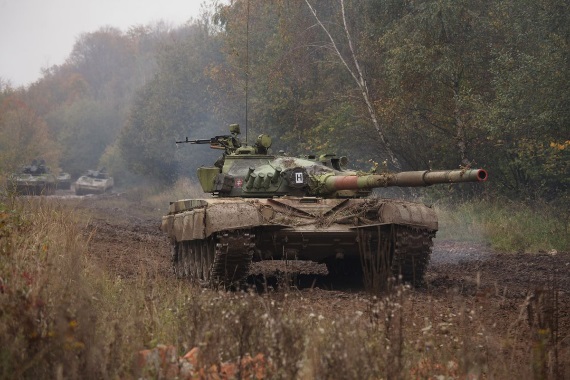 In the evaluated period authorized users were regularly informed in a complex way about narrow relation and interconnection of both issues, about the so called troll issue, identified forms and methods of information – psychological operation, activities of resident and foreign private security companies and civil associations active or formerly active within our area, modus operandi and current activities of foreign intelligence services. Intelligence information had been accessed to the relevant subjects of security sector of the SR.
In the evaluated period authorized users were regularly informed in a complex way about narrow relation and interconnection of both issues, about the so called troll issue, identified forms and methods of information – psychological operation, activities of resident and foreign private security companies and civil associations active or formerly active within our area, modus operandi and current activities of foreign intelligence services. Intelligence information had been accessed to the relevant subjects of security sector of the SR.
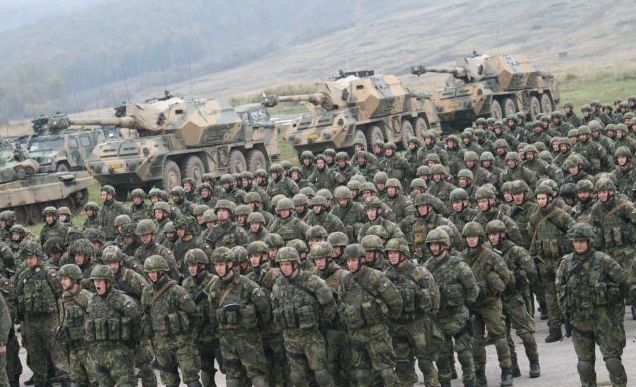 It had been evaluated that negative impacts of the mentioned threats are shown in relation to securing combat potential of the SR, mainly in connection to the part of the spectrum of source and support capacities (or activities) of organizational branches of OS SR. Mainly within the personnel area, they have the potential negatively to influence the ethics and loyalty of the OS SR. In a negative way they also influence public attitude towards OS SR and they have the potential to polarize society through security issue. Besides information activity , in connection with the afore mentioned threats, in the field of intelligence security measures, had been adopted in the cooperation with relevant authorities of OS SR in order to enhance intelligence protection and secure training activities of OS. It concerns series of military exercises and activities with international participation „Nový Horizont“, „Slovenský Štít“ and „Dragoon Crossing“. Except this, in the evaluated period, relevant authorities of OS SR were provided with intelligence support for decision making processes that are related to the plans of deployment and utilization of OS SR processes of defence planning.
It had been evaluated that negative impacts of the mentioned threats are shown in relation to securing combat potential of the SR, mainly in connection to the part of the spectrum of source and support capacities (or activities) of organizational branches of OS SR. Mainly within the personnel area, they have the potential negatively to influence the ethics and loyalty of the OS SR. In a negative way they also influence public attitude towards OS SR and they have the potential to polarize society through security issue. Besides information activity , in connection with the afore mentioned threats, in the field of intelligence security measures, had been adopted in the cooperation with relevant authorities of OS SR in order to enhance intelligence protection and secure training activities of OS. It concerns series of military exercises and activities with international participation „Nový Horizont“, „Slovenský Štít“ and „Dragoon Crossing“. Except this, in the evaluated period, relevant authorities of OS SR were provided with intelligence support for decision making processes that are related to the plans of deployment and utilization of OS SR processes of defence planning.
MI activity the field of fight against terrorism was focused on evaluation of indicators of terrorist attack threats aimed against SR mostly against people, objects and facilities of the defence department. MI within its competence, had focused its attention on monitoring of local and foreign risk communities with connections to OS SR members or Slovak citizens with a connection to Defence Department. Attention was paid on identification of active and passive supporters of jihadi groups with connections to SR.
 Activities of AL-QAEDA, its branches and ISLAMIC STATE (further reference as „IS“, so called DAESH)10)has been still sources of threats of terrorism aimed against countries of EU, NATO and their interests. MI had taken active measures against the most relevant sources of terrorism threats regarding intensive support of intelligence community within SR and within structures of The National Security Analytical Center (further reference as „NBAC“). In this regard the MI supports NBAC by active involvement of its members to its performance. Besides above stated facts in the field of fight against terrorism cooperation with foreign partnership services was used in an intensive way. The core of this cooperation is based on operative cooperation and mutual exchange of collected intelligence and information. The aim is identification of jihadi groups’ supporters (logistic support, sleeping cells, etc.), respectively members of terrorist organisations who are making efforts to infiltrate Schengen area misusing the migration issue.
Activities of AL-QAEDA, its branches and ISLAMIC STATE (further reference as „IS“, so called DAESH)10)has been still sources of threats of terrorism aimed against countries of EU, NATO and their interests. MI had taken active measures against the most relevant sources of terrorism threats regarding intensive support of intelligence community within SR and within structures of The National Security Analytical Center (further reference as „NBAC“). In this regard the MI supports NBAC by active involvement of its members to its performance. Besides above stated facts in the field of fight against terrorism cooperation with foreign partnership services was used in an intensive way. The core of this cooperation is based on operative cooperation and mutual exchange of collected intelligence and information. The aim is identification of jihadi groups’ supporters (logistic support, sleeping cells, etc.), respectively members of terrorist organisations who are making efforts to infiltrate Schengen area misusing the migration issue.
In the field of fighting the extremism the MI had continuously taken measures to identify in time any of its displays in relation to the Department of defence with the cooperation with bodies acting in criminal procedure. MI had identified members of the Defence Department who sympathize, support or even participate in activities of paramilitary informal organisations or local and foreign extremist subjects. Preventive measures had been taken also within admission process into Professional soldier’s civil service. In the frame of evaluated period the authorized users were informed about a narrow connection and interconnection of this issue with the information – psychological impact and activities of foreign intelligence services.
Radical and extremist subjects could be misused by potential enemy in the frame a hybrid mode of conducting combat operations. Extremist subjects possess potential to polarize and destabilize society. Dangerous trend could be seen in their establishment on political scene within the state system, an effort to penetrate security forces of the state, the change of modus operandi (mainly retreat from an open ideological propaganda and transition to its hidden forms, improving their managing and organisational structures, efforts of coordination, more intensive and close cooperation with foreign extremist subjects, more intensive work with the generation of children and youth, etc.), gradual militarization and armament.
Regarding security of the Defence Department against the activities of foreign intelligence services, the activity of the MI was focused on detection, intelligence documentation and prevention of any activities of foreign intelligence services. The increase of foreign intelligence services activities on the territory of the SR had been noticed in the evaluated period, similarly as in the majority member countries of NATO and EU. The performance of foreign intelligence services is focused on gathering information about decision making processes and military operational procedures of NATO, current political, security, economic and energetic situation. Foreign intelligence services actively realize information and psychological operations aimed to support their foreign policy interests and disinformation dissemination. Their goal is to support efforts of foreign powers to change the architecture of the security system in Europe, decrease credibility and discredit eligibility of EU and NATO, discredit activities of so called Western countries, to polarize society, deepen in it discrepancies and lower credibility of state and state´s authorities representatives.
Concerning the protection of classified information the intelligence performance was predominantly focused on security verification of reliability of authorized people to get acquainted with classified information, continuous evaluation of collected data and predication of potential security risks or other facts that could have an impact on security reliability of these persons.
MI had evaluated information about exports and re-exports of military material with participation of Slovak commercial subjects and interconnections of Slovak processing and commercial companies with these activities11). The MI had actively taken intelligence measures aimed at an early acquirement of initial information about illegal trading with conventional weapons, weapon systems and military material that could be exported to the conflict areas and serve as a support of terrorism or could be used in local military conflicts.
In this field an overlap had been noticed with the issue of foreign intelligence services. A trend of establishing private security and commercial subjects had been recorded with foreign participation that could be from mid-term or long term point of view utilized in terms of hybrid way of operating combat operations, respectively in terms of supporting terrorist, extremist and criminal activities. Regarding the protection of military – industrial interests of SR intelligence activity had been dedicated predominantly to active measures towards to fulfilment of financially demanding contracts with the focus on possible uneconomic and ineffective handling with financial means, failure to perform commitments regarding contract items, possible corruption and clientelism with negative impact on protected interests of SR.
The MI had monitored and taken measures in the area of organised crime and drug criminal activity having relation to the Department of Defence. In the evaluated period no information was collected that could indicate serious threat towards the Department of Defence. By realization of particular cases (mainly in the cases of illegal weapon handling and drug criminal activity) the cooperation was established with relevant department authorities and other subjects; the emphasis was laid on intelligence collection, its distribution for further use in the sphere of competence of law enforcement authorities and applying disruptive measures to eliminate troublesome persons from the OS SR environment.
In 2015 in the field of personnel security (security checks of from II. to IV. degree) were accepted 1530 applications to carry out the security check. From the mentioned number 1112 security checks were completed by submitting the proposal to National Security Office. Due to finding out security risks in 25 cases a proposal was processed to issue a decision (in accordance with legislation). In the connection with issuing certificates of NATO and EU to the authorized persons within the MO SR were performed 5033 administrative and registration procedures.
The MI in the evaluated period was involved in the process of realization of security checks of persons carried out by NBÚ by providing 2491 written feed backs related to submitted requests in accordance with the act No. 215/2004 on protection of classified information subsequently amended (hereinafter as OUS Act). In the e field of physical security and object security tasks had continuously been accomplished on consideration of the real state of matters, accuracy and completeness of security documentation and their annexes. In addition to abovementioned tasks methodical and preventive – educational activities with the NBU SR cooperation were also carried out in this field. In the area of physical and industrial security in the evaluated period were considered contracts and expert statements were issued on 32 contracts on conveyance of classified information and 75 annexes to the contracts on conveyance of classified information. In the evaluated period MI had been involved in process of security check of businessmen carried out by NBU by providing 115 written statements on requests according to the OUS Act.
In the field of administrative security was during the year 2015 within competence of department of defence registered 10 cases of suspicion regarding unauthorized manipulation with classified information and 12 contravention on the department of classified information. The elucidating of contraventions in this department was secured in collaboration with Military Police.
Within interdepartmental cooperation MI had been involved in activities of different expert authorities and groups (e. g. Expert group on Exchange coordination and information analyses and collaboration in the field of fight against terrorism, Multidisciplinary group focused on elimination of race motivated criminal acts and extremism, Interdepartmental expert coordination authority for fight against criminality, Permanent expert group of Ministry of Economy of SR, etc.).
Within bilateral and multilateral cooperation 45 activities accomplished in the SR and abroad , broader concept of meetings of Directors of Military Intelligence Services of the V4 countries, bilateral negotiations on an expert level with partnership services, negotiations in NATO and EU.)
The MI, had been, in accordance with tasks established by law cooperating on operational and information level with partner organizations of 18 countries states, NATO International Intelligence Staff, EU Military Staff and the Supreme alliance headquarters NATO in EU.
The MI has its representation in an intelligence and security structures, as well as in NATO and EU operations. Credibility of appointed MI members is approved by positive merit rate of NATO and EU supreme representatives. From this reason requests to occupy new positions are increasing.
- 1) Priorities are defined by the focus of the intelligence performance within the particular year. Authorized control Committee of NR SR was acquainted with content on the document „Focus of intelligence activity of Military Intelligence for the year 2015“.
- 2) Armed forces of states that could possibly be adverse against the interests of SR and its international commitments regarding military issues.
- 3) Within so called information or hybrid war (community of experts defined the mentioned notions as information and psychological influence on citizens and hybrid way of conducting combat operations.)
- 4) ISTAR – Intelligence, surveillance, target acquisition and reconnaissance
- 5) NATO CI COE – NATO Counterintelligence Centre of Excellence
- 6) MI MO SR had participated on preparation of the materials.
- 7) Migration processes, activities of foreign intelligence services, terrorism, dissemination of weapon systems, armament and military technologies and radicalism and extremism.
- 8) E.g. the act No. 319/2002 on Defence of SR and the act No. 321/2002 on Armed Forces of SR, international contracts and commitments of SR in terms of collective security, general security and international disarmament commitments.
- 9) Depending also on processes of training, research, development, modernization, acquisition, utilization and replacement of technical equipment, armament, equipment and further materials.
- 10) Activities of AL-QAEDA core were attenuating as a result of combat operations on Afghan Islamic Republic (AFG) and Pakistan Islamic Republic (PAK). Significant growth of activities and capabilities of jihadi groups is recorded predominantly as a result of the Syrian Arab Republic (SYR) conflict. In this area are active jihadi groups FRONT AL NUSRA and IS. They have direct organisational connection on jihadi environment in The Republic of Iraq (IRQ). Conflict in SYR contents potential that destabilizes the whole region and therefore creates an accurate basis for organizational basis of international terrorism. In the evaluated period the trend of shifting certain parts of organisational structures and fighters to the regions of North Africa (the area of Libya) had been noticed.
- 11) The aim of measurements regarding the control of business with goods of defence industry is to identify real end user of the traded commodity in connection to restrictive measurements of international institutions to which is SR bounded.